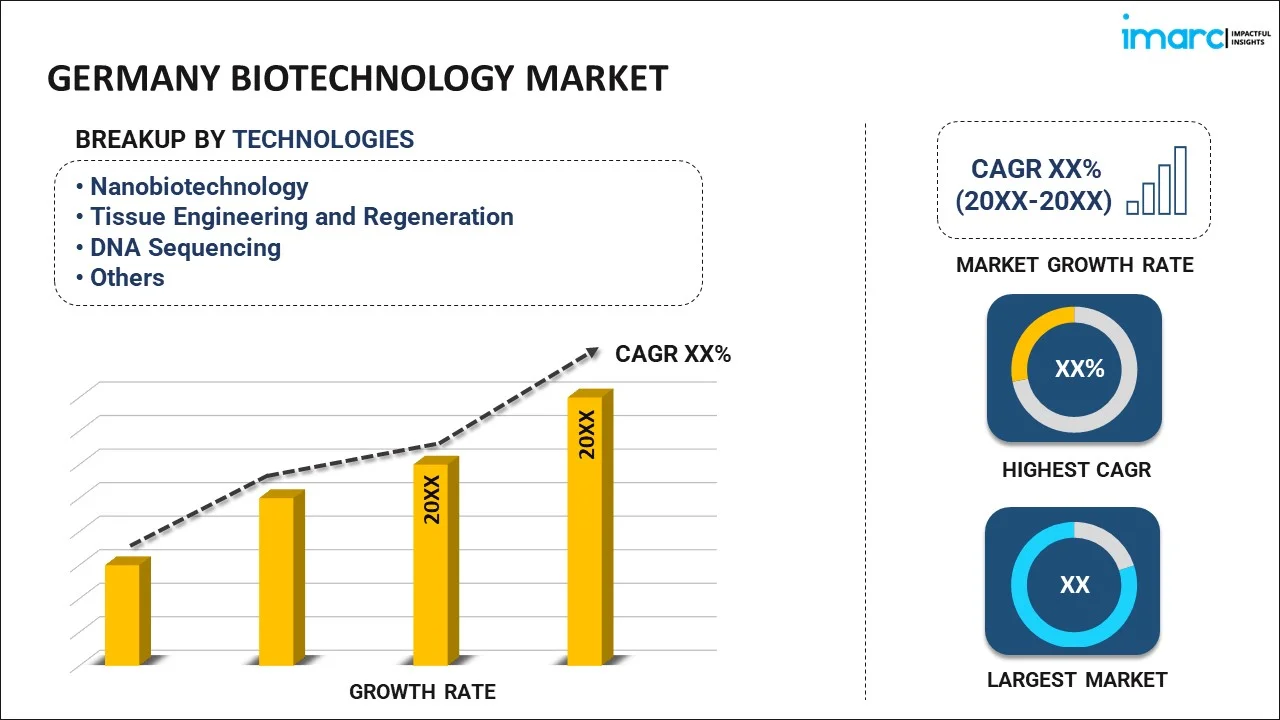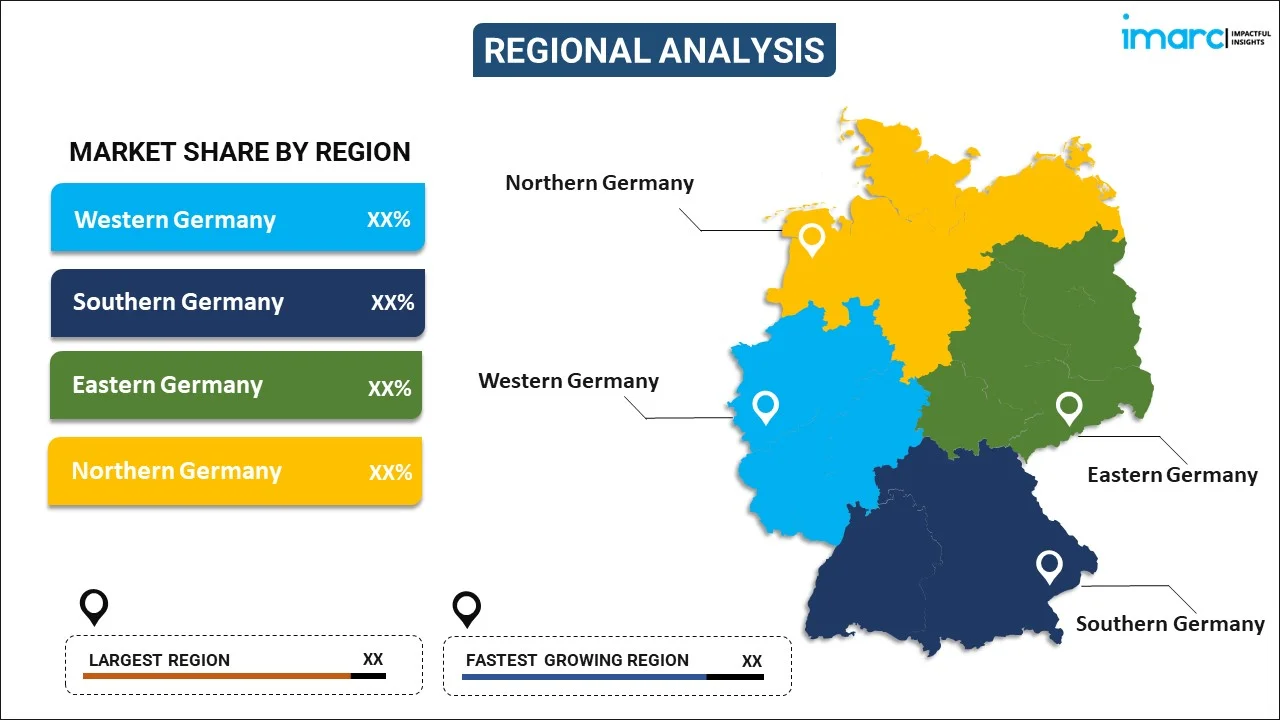
Germany Biotechnology Market Report by Technology (Nanobiotechnology, Tissue Engineering and Regeneration, DNA Sequencing, Cell-Based Assays, Fermentation, PCR Technology, Chromatography, and Others), Application (Healthcare, Food and Agriculture, Natural Resources and Environment, Industrial Processing, Bioinformatics, and Others), and Region 2026-2034
Germany Biotechnology Market Overview:
The Germany biotechnology market size reached USD 70.6 Billion in 2025. Looking forward, IMARC Group expects the market to reach USD 256.9 Billion by 2034, exhibiting a growth rate (CAGR) of 15.44% during 2026-2034. Ongoing advancements in genomics and molecular biology, increasing demand for personalized medicine, rising prevalence of chronic diseases, government funding and support, and technological innovations in biopharmaceuticals and agricultural biotechnology represent some of the key factors driving the market growth.
|
Report Attribute
|
Key Statistics
|
|---|---|
|
Base Year
|
2025
|
|
Forecast Years
|
2026-2034
|
|
Historical Years
|
2020-2025
|
| Market Size in 2025 | USD 70.6 Billion |
| Market Forecast in 2034 | USD 256.9 Billion |
| Market Growth Rate 2026-2034 | 15.44% |
Access the full market insights report Request Sample
Germany Biotechnology Market Trends:
Advancements in genomics and molecular biology
The significant reductions in both cost and time required to sequence deoxyribonucleic acid (DNA) due to the completion of the Human Genome Project and subsequent advancements in sequencing technologies have revolutionized the field of genetics. This progress has deepened our understanding of genetic factors in various diseases and traits, enabling the development of more targeted therapies. Moreover, the advent of gene-editing techniques like Clustered Regularly Interspaced Short Palindromic Repeats (CRISPR) - Cas9 allowing precise DNA modifications, offering new treatments for genetic disorders, and improving agricultural crop yields and resistance is aiding in market expansion. These advancements enhance research capabilities and drive commercial applications in diagnostics, therapeutics, and agriculture. Consequently, the biotechnology market is experiencing rapid growth, with investments pouring into companies developing innovative genetic technologies and products.
Increasing demand for personalized medicine
The rising demand for personalized medicine that offers tailored treatment depending on individual patient characteristics is contributing to the market growth, as it leverages biotechnological tools for genetic, proteomic, and metabolomic analysis. Knowing a patient's genetic composition allows for customized treatment regimens that improve both safety and effectiveness. With the growing availability of genetic testing and the incorporation of artificial intelligence (AI) and big data analytics into healthcare, precision medicine is widely bein adopted. Moreover, companies are investing in biomarkers and companion diagnostics development, which is crucial for precise treatment identification. This trend is propelling the growth of the biotechnology sector, promising improved outcomes and reduced healthcare costs through minimized adverse reactions and enhanced efficacy.
Technological innovations in biopharmaceuticals
Biopharmaceuticals, or biologics, are complex drugs derived from living organisms that have revolutionized the treatment of many diseases, including cancer, autoimmune disorders, and infectious diseases. Innovations in bioprocessing technologies, such as single-use systems and continuous manufacturing, have improved the efficiency and scalability of biologics production. Additionally, advancements in recombinant DNA technology, monoclonal antibody production, and cell and gene therapies are expanding the range of therapeutic options available. The development of biosimilars, which are nearly identical copies of original biologic drugs, is also contributing to market growth by providing more affordable treatment options. Furthermore, the integration of advanced analytics and digital technologies in biopharmaceutical development and manufacturing is enhancing the precision and speed of drug discovery and production processes. These innovations are driving the biotechnology market by enabling the development of more effective and diverse therapeutic products, meeting the growing demand for advanced healthcare solutions.
Germany Biotechnology Market News:
- In September 2023, Merck KGaA collaborated with BenevolentAI and Exscientia, leveraging artificial intelligence (AI) for drug discovery in oncology, neurology, and immunology, with the potential to produce innovative candidates for clinical development.
Germany Biotechnology Market Segmentation:
IMARC Group provides an analysis of the key trends in each segment of the market, along with forecasts at the country level for 2026-2034. Our report has categorized the market based on technology and application.
Technology Insights:

To get detailed segment analysis of this market Request Sample
- Nanobiotechnology
- Tissue Engineering and Regeneration
- DNA Sequencing
- Cell-Based Assays
- Fermentation
- PCR Technology
- Chromatography
- Others
The report has provided a detailed breakup and analysis of the market based on the technology. This includes nanobiotechnology, tissue engineering and regeneration, DNA sequencing, cell-based assays, fermentation, PCR technology, chromatography, and others.
Application Insights:
- Healthcare
- Food and Agriculture
- Natural Resources and Environment
- Industrial Processing
- Bioinformatics
- Others
A detailed breakup and analysis of the market based on the application have also been provided in the report. This includes healthcare, food and agriculture, natural resources and environment, industrial processing, bioinformatics, and others.
Regional Insights:

To get detailed regional analysis of this market Request Sample
- Western Germany
- Southern Germany
- Eastern Germany
- Northern Germany
The report has also provided a comprehensive analysis of all the major regional markets, which include Western Germany, Southern Germany, Eastern Germany, and Northern Germany.
Competitive Landscape:
The market research report has also provided a comprehensive analysis of the competitive landscape. Competitive analysis such as market structure, key player positioning, top winning strategies, competitive dashboard, and company evaluation quadrant has been covered in the report. Also, detailed profiles of all major companies have been provided.
Germany Biotechnology Market Report Coverage:
| Report Features | Details |
|---|---|
| Base Year of the Analysis | 2025 |
| Historical Period | 2020-2025 |
| Forecast Period | 2026-2034 |
| Units | Billion USD |
| Scope of the Report | Exploration of Historical Trends and Market Outlook, Industry Catalysts and Challenges, Segment-Wise Historical and Future Market Assessment:
|
| Technologies Covered | Nanobiotechnology, Tissue Engineering and Regeneration, DNA Sequencing, Cell-Based Assays, Fermentation, PCR Technology, Chromatography, Others |
| Applications Covered | Healthcare, Food and Agriculture, Natural Resources and Environment, Industrial Processing, Bioinformatics, Others |
| Regions Covered | Western Germany, Southern Germany, Eastern Germany, Northern Germany |
| Customization Scope | 10% Free Customization |
| Post-Sale Analyst Support | 10-12 Weeks |
| Delivery Format | PDF and Excel through Email (We can also provide the editable version of the report in PPT/Word format on special request) |
Key Questions Answered in This Report:
- How has the Germany biotechnology market performed so far and how will it perform in the coming years?
- What has been the impact of COVID-19 on the Germany biotechnology market?
- What is the breakup of the Germany biotechnology market on the basis of technology?
- What is the breakup of the Germany biotechnology market on the basis of application?
- What are the various stages in the value chain of the Germany biotechnology market?
- What are the key driving factors and challenges in the Germany biotechnology?
- What is the structure of the Germany biotechnology market and who are the key players?
- What is the degree of competition in the Germany biotechnology market?
Key Benefits for Stakeholders:
- IMARC’s industry report offers a comprehensive quantitative analysis of various market segments, historical and current market trends, market forecasts, and dynamics of the Germany biotechnology market from 2020-2034.
- The research report provides the latest information on the market drivers, challenges, and opportunities in the Germany biotechnology market.
- Porter's five forces analysis assist stakeholders in assessing the impact of new entrants, competitive rivalry, supplier power, buyer power, and the threat of substitution. It helps stakeholders to analyze the level of competition within the Germany biotechnology industry and its attractiveness.
- Competitive landscape allows stakeholders to understand their competitive environment and provides an insight into the current positions of key players in the market.
Need more help?
- Speak to our experienced analysts for insights on the current market scenarios.
- Include additional segments and countries to customize the report as per your requirement.
- Gain an unparalleled competitive advantage in your domain by understanding how to utilize the report and positively impacting your operations and revenue.
- For further assistance, please connect with our analysts.
 Request Customization
Request Customization
 Speak to an Analyst
Speak to an Analyst
 Request Brochure
Request Brochure
 Inquire Before Buying
Inquire Before Buying




.webp)




.webp)












